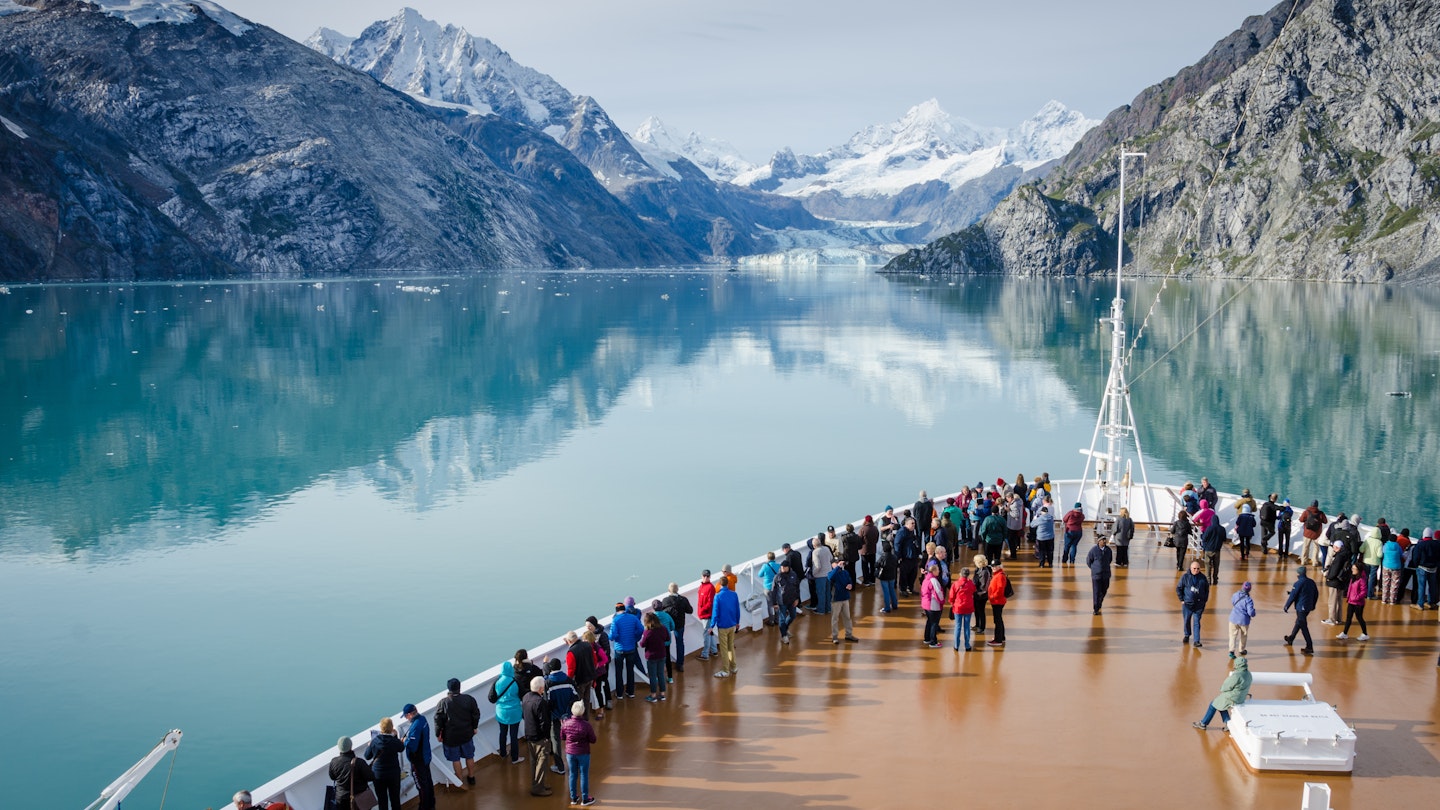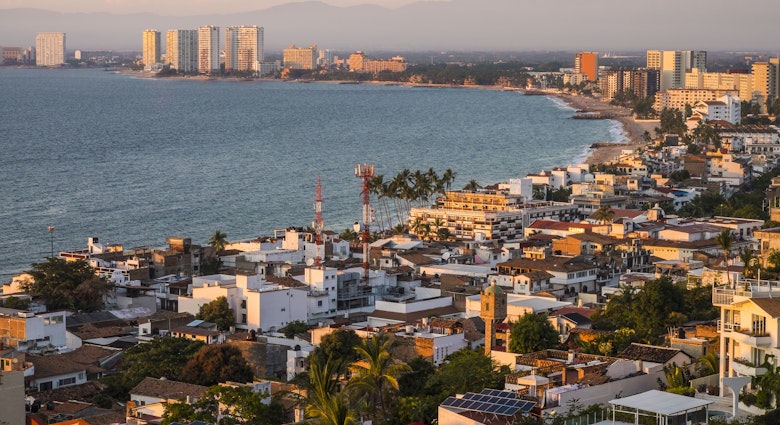
Help me choose: which Alaska Cruise is right for me?

Apr 23, 2024 • 7 min read

Taking to the water is a wonderful way to see Alaska's incredible coastline © Bala Sivakumar / Getty Images
Alaska's impressive southern coastlines contain hordes of island archipelagos, deep fjords and ancient glaciers. Nearly all of the area is roadless, so seafaring vessels, including cruise ships, are a popular way for visitors to experience these pristine areas.
Large cruise companies sail Alaska's Inside Passage from Seattle, Washington and Vancouver, and on through the Gulf of Alaska to Seward or Whittier. In between, passengers usually stop in Ketchikan, Juneau and Skagway, and then sail up College Fjord to see glaciers stretching their icy fingers into the sea. You'll see plenty of stunning scenery along the way but not up close – for most cruisers, it's more than enough to satisfy.
Smaller cruises max out at around 200 passengers and can nose into Southeast Alaska's nooks and crannies, launching skiffs and kayaks from their lower decks for an immersive shore visit full of exploration. These vessels may not stop in local ports, instead anchoring at night and offering guests the chance to hike a remote shoreline, whale-watch from a kayak or attend a presentation by indigenous artisans. If any ports are visited, they're likely to be smaller communities like Wrangell, Sitka, Petersburg and Yakutat.
Additionally, with the Northwest Passage now open to marine traffic, the northwestern city of Nome is a regular port of call for higher-end, midsize cruise lines to expose passengers to the rural reaches of coastal Alaska. The Aleutian Island city of Unalaska is also on some boutique cruise line itineraries, so check carefully that the region that sparks your interest.

Which part of Alaska should I choose to cruise?
For an overview of Alaska
The standard Inside Passage cruise between Vancouver or Seattle and Seward or Whittier is an excellent choice, boasting beautiful scenery and the chance to experience a route taken by steamships of the late 1800s. You’ll get a snapshot of the Tongass National Forest, glaciers and the occasional whale or bear, but not up close unless you’re on a specific shore excursion. Holland America, Cunard and Viking all have cruises that fit this itinerary.
Taking a deep dive into Alaska’s coastal regions
Book a small ship cruise between Sitka, Ketchikan, and Juneau for a week or longer in the nooks and crannies of southeast Alaska. You’ll hike where there are no trails, paddle without another human in sight, and get to know the traditional lands of Alaska’s Coastal Native tribes. We like Alaskan Dream Cruises, UnCruise Adventures and Lindblad Expeditions for smaller, more sustainable cruises.
To discover Alaska’s rich history
You can’t skip Ketchikan, Juneau or Skagway on an itinerary. Juneau is the state capital and a former mining community. Ketchikan once was a major player in the timber industry and has a sordid past steeped in bootlegging and brothels. Skagway was a jumping-off point for the Klondike Gold Rush beyond Chilkoot Pass and has an old railroad to prove it. All three cities are often on large ship itineraries.
Explore Alaska’s most remote coastal areas
Consider a luxury midsize (or smaller) cruise to places like Dutch Harbor in the Aleutian Islands or to the northwestern city of Nome. Both combine a look at the rugged, raw coastlines with time spent on shore in towns with few frills. Weather can often be cold, rainy and windy, but if you want a unique adventure in Alaska, check out the itineraries from Hurtigruten.

When should I go?
Depending on the cruise line, sailings begin in late April and continue through to early October. The most dependable weather typically appears in July and August, but that's also the most popular (and expensive) time; pick a trip earlier or later in the season for cheaper passage and shore excursions.
For spring and fall passengers, know that temperatures will be cooler than you might expect and variable types of precipitation, including snow showers, aren't unusual. In the summer, it's still cool on deck and near glaciers, so don't expect a lot of outdoor pool time or sunbathing on board.
If spotting wildlife is a priority, consider cruising during the salmon runs, when bears are most active and can be spotted from the decks of the ship. Humpback whales often follow schools of herring and other small fish during the summer and can be seen anytime between May and September before they migrate to Hawaii or Mexico.
How do I know my cruise line is operating sustainably?
While all travel has environmental and cultural impacts, cruising leaves its mark to varying degrees on Alaska's fragile ecosystems. The average large cruise ship can have a carbon footprint greater than 12,000 cars and produce up to a ton of trash each day. While there can be a positive economic impact on ports of call, a small community visited by 15,000 people per day during sailing season can intrinsically change.
The industry's trade group Cruise Line International Association (CLIA) touts a desire for "conscious cruising." They have guidelines for water conservation and upgrades to heating, air-conditioning and ventilation, with a goal for ships to be net zero by 2050. There is also a focus on respecting the cultural traditions of destinations through cooperative regenerative tourism that preserves a community's unique history, culture and values.

What kinds of activities can we experience?
Onshore activities differ depending on the size and style of the cruise. Traditional excursions are created to fit a specific number of people, all of whom come from the ships and are expected to be in port for a specific time. They provide an overview of Alaska's history, culture, recreation and industry, and don't offer much of a personal touch.
Smaller boutique cruises strive to immerse their guests in the wild Alaska they've researched and desire to experience. Trips to shore rarely involve large port cities except for embarking and disembarking – instead, they drop kayaks in the water from the ship or use a rubber skiff to reach a deserted shoreline for a hike. The communities they visit are usually smaller, like Petersburg, Wrangell or Haines.
Glacier & Wildlife Tours: Cruise for a few hours aboard a smaller vessel to witness whales, otters, seals and icy glaciers.
Dogsledding: Learn about mushing, huskies and the operations of sled-dog kennels before taking a spin behind a team.
ATV Adventuring: Rev up for a wilderness or tundra tour aboard a four-wheeler or side-by-side vehicle.
Flightseeing: Take a unique peek at Alaska's landscapes from above, spotting wildlife, and ogling glaciers and mountain ranges.
Alaska Native Traditions: Learn the ways of Alaska's many tribal groups, with dancing, drumming and art displays as part of the program.
Ride a Historic Train: Skagway's White Pass Yukon Railroad climbs over Chilkoot Pass for a hands-on gold-rush history tour.
Paddle Power: Hop in a raft or kayak and explore Alaska's beautiful coastlines and rivers.
Need-to-know before you go
Plan for wet weather
Alaska’s southeastern region is part of a rainforest, where wet conditions are the norm even in summer. Bring waterproof rain gear, sturdy shoes, a hat and gloves to stay warm and dry.
Know your physical limits
If mobility or other health issues may affect your ability to enjoy a cruise to the fullest, consider traveling with a larger operator. These companies are well-versed in accessibility and have made accommodations for those with mobility needs. Smaller ships are full of trip hazards and watertight door jambs and require bending and stepping up or down to access activities like kayaking or skiff rides.
Plan your own shoreside activities
There is no requirement to book excursions or activities through the cruise line. If a more independent style of exploration is your thing, feel free to do your own research ahead of time or visit each port of call’s visitor bureau upon arrival. Just be sure to adhere strictly to the ship’s boarding time.
Look to shoulder season sailings
Not only will you often receive a significant discount, you’ll also be able to witness Alaska’s seasonal transitions and fewer crowds at ports of call.
Know what "all-inclusive" really means: Drill down into the details of your cruise and ask questions about meals, alcoholic beverages, activities and shore trips. It may be that a smaller cruise line will include everything at one price.
Explore related stories









